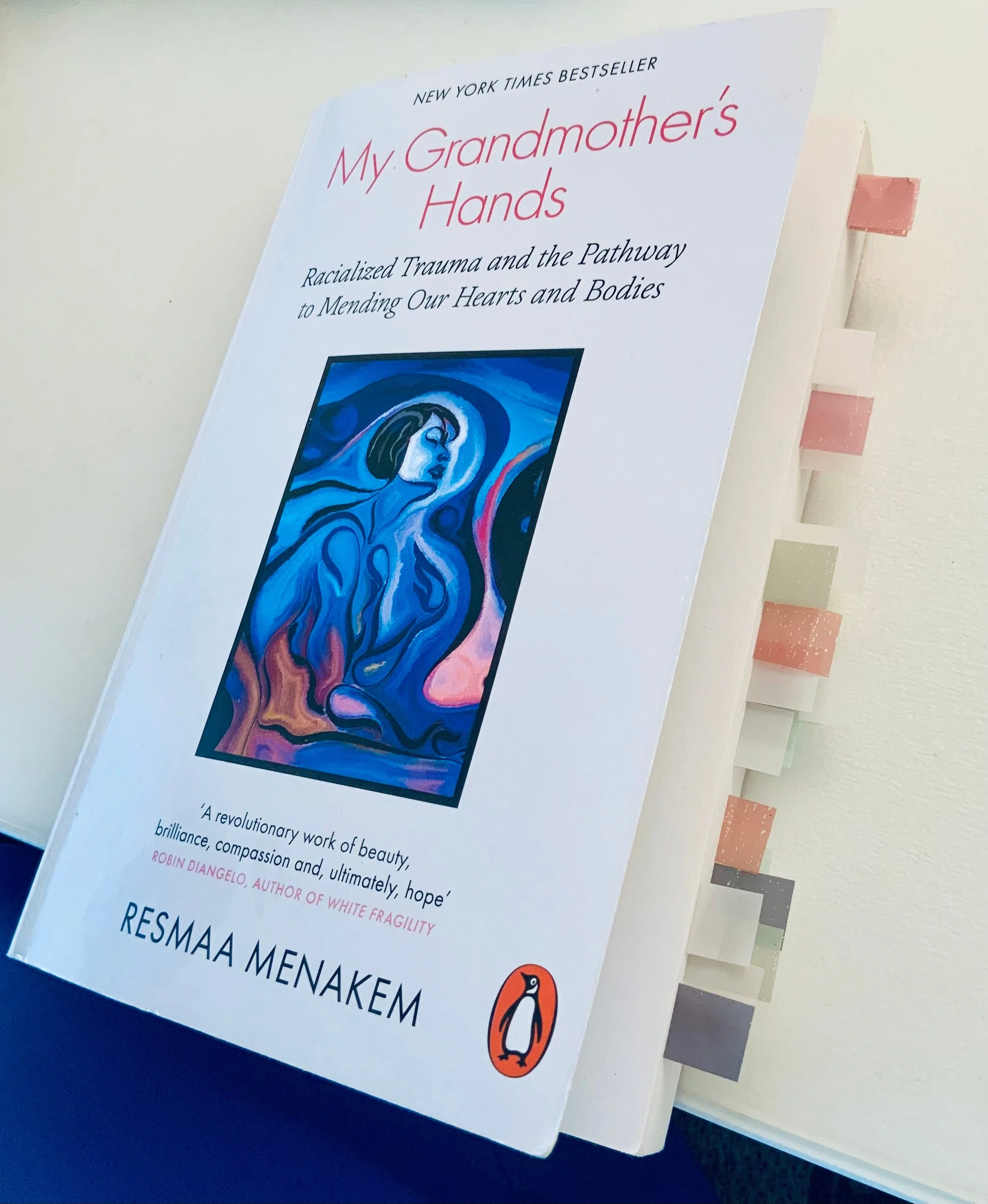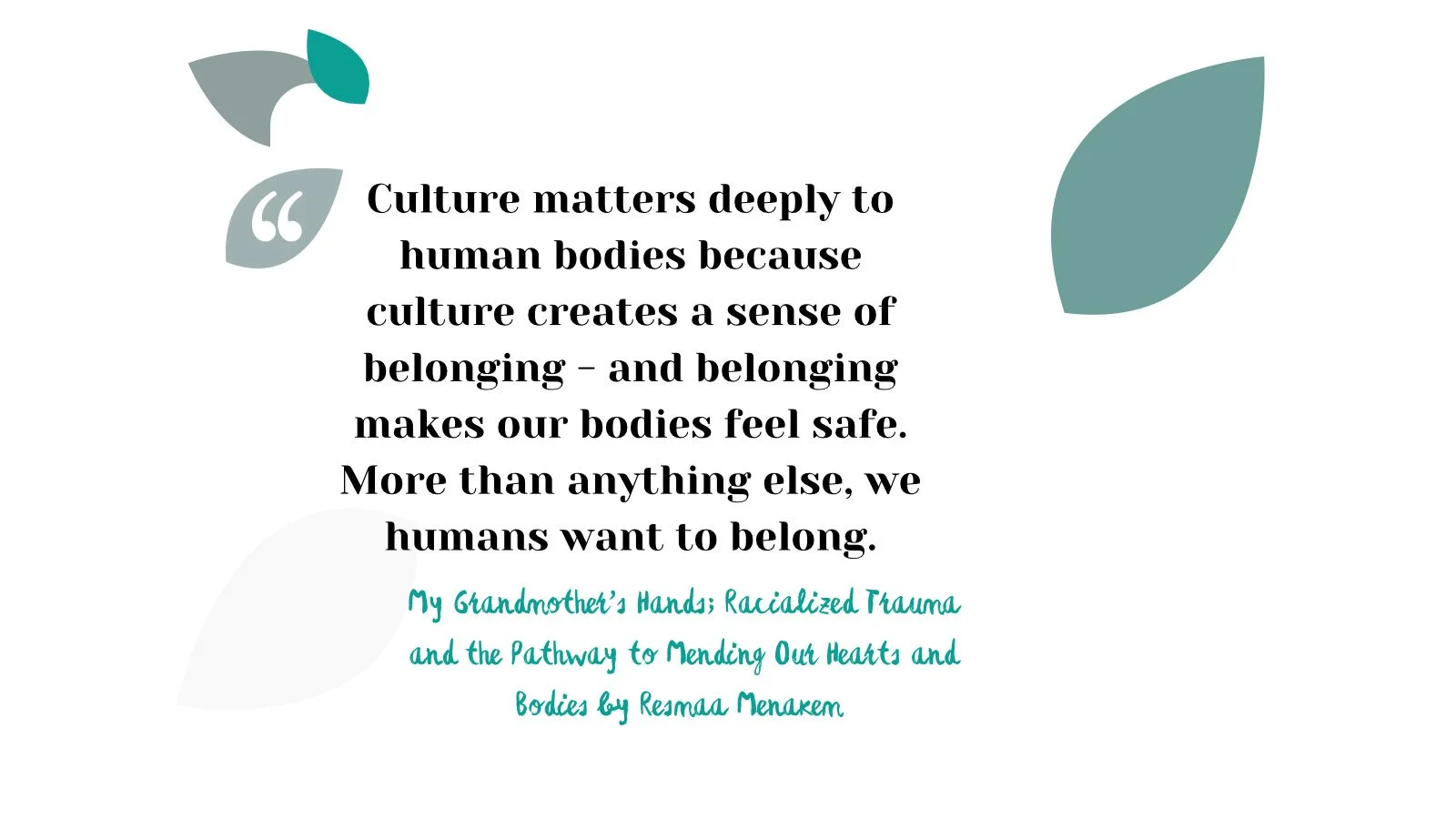Our Bodies are in a Complex Relationship with Culture.
Understanding the Somatic Impact of Culture and Community on Young Adults' Mental Health and Behaviours
A little late to the party, recently I had the pleasure of reading Resmaa Menakem’s profound book, "My Grandmother’s Hands; Racialised Trauma and the Pathway to Mending Our Hearts and Bodies". Menakem writes from an American perspective, delving deeply into the trauma that Black Americans carry and its multifaceted impacts on individuals and communities. While his focus is on the American context, the insights provided in the book resonate far beyond, offering valuable lessons for audiences in the UK and elsewhere.
As a white British therapist, Menakem's work has profoundly influenced my understanding of the somatic impacts of culture on our bodies, both individually and collectively. The book reinforces how trauma is not just a psychological or emotional experience but a physical one that embeds itself within our bodies and is passed down through generations. Historically my understanding of different cultures and generational trauma was there in a very cognitive sense. I tried to read the right books and of course listened to my clients carefully. I asked questions if I didn’t understand and followed advice around accessing resources. But whilst I considered the here and now impact of trauma on the body, I didn’t have any concept of how this moved through families and communities; the conversation of culture and interplay between different groups and that this also has a strong somatic impact.
This realisation is crucial for professionals working with young adults, as it highlights the importance of addressing the physical manifestations of cultural and generational trauma which is likely more prevalent whilst they are living at home, with family and amongst traditions and learning core beliefs.
Menakem emphasises that trauma lives in the body, impacting mental health, physiology, behaviours and physical health. For Black Americans, this trauma is often rooted in the historical and ongoing experiences of racial oppression. The physical effects of this trauma can manifest in various ways, from chronic health conditions like heart disease, to heightened stress responses, for example what I have previously termed hyper-vigilance, Menakem refers to trauma ghosting “this is the bodies recurrent or pervasive sense that danger is just around the corner” something I have seen in my work with local Jewish communities where generational fear can still be raw.
This understanding transcends racial boundaries, as anyone can experience the physical repercussions of trauma passed down through generations. For professionals in the UK, this means recognising that young adults from all backgrounds may carry somatic burdens from their cultural and familial histories. Generational trauma can occur through direct communication, behaviours, and even at a cellular level through epigenetics (a change in cell function). Young adults today may exhibit behaviours and mental health challenges rooted in traumas experienced by their ancestors. Ignorance of these dynamics can lead to a misjudgment of the cause of their issues or offering ineffective support strategies.
One of the key takeaways from Menakem’s book is the ripple effect of everyday interactions. Conversations and assumptions made within communities can either perpetuate trauma or help to heal it. For instance, making assumptions based on stereotypes or ignoring the cultural contexts of young adults can reinforce feelings of alienation and stress. On the other hand, open, empathetic conversations that acknowledge and validate their experiences can be deeply healing. Remember that we can live only a street away and still be part of a different community and culture, with different values, expectations, core value, beliefs and perception of the world. Professionals must be mindful of the language they both witness young adults using, and also their own language use and the cultural sensitivities and personal belief systems they navigate in their work.
Menakem also underscores the power of choice in the healing process. Young adults need to feel empowered to make choices about their mental health and wellbeing. This starts with asking the right questions, bringing forward a narrative around culture and history. Formulating the knowledge and resources to understand their experiences and encouraging them to take an active role in their healing journey. Professionals can support this by fostering an environment of trust and respect, where young adults feel safe to express themselves and explore their identities. By considering the physical manifestations of trauma, the effects of everyday interactions, and the historical and cultural contexts, professionals can offer more nuanced and effective care.
Resmaa Menakem’s "My Grandmother’s Hands" is an highly recommended read for anyone interested in deepening their understanding of racial trauma and its somatic impacts. For professionals supporting young adults, this book offers invaluable insights into how culture and community influence mental health and behaviours. By integrating these lessons into their practice, therapists, counsellors, and educators can better support the young adults of today, helping them navigate their challenges and foster resilience. I highly recommend Menakem’s work to anyone looking to expand their knowledge and empathy in this critical area.


